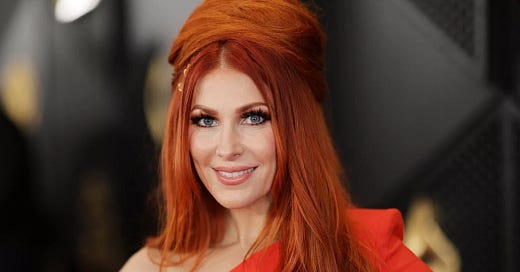The DIY Pop Star: A Conversation with Bonnie McKee
After decades writing hits for Katy Perry, Taio Cruz, and Kesha, Bonnie McKee decided to spend more time on her own music.
When I was set to talk to Bonnie McKee, I was a bit nervous. She’s cowritten some of the biggest hits of the last two decades, including Katy Perry’s “Teenage Dream,” a song that I think is up there with the best pop songs of The Beatles, ABBA, and Michael Jackson. During our conversation, I dropped the professional facade and allowed myself to gush about that song for a few moments. I’m sure McKee has heard people gush about her songs ad nauseam. She’s cowritten smashes for Kesha, Taio Cruz, Kelly Clarkson, and so many others. But I had to let her know just in case.
Over a half hour, McKee related many tales from the songwriting trenches to me. But we spent just as much time talking about her career as an artist, advocate, mentor, and social media sensation. It was one of my favorite interviews that I’ve done thus far. If you want to keep up with the inimitable Bonnie McKee, sign up for her newsletter, Pop City.
I was listening to your song “Forever 21,” and I was struck by how visual the music and the lyrics are. Then I went to watch the video, and I noticed how visual storytelling was almost as important as the musical storytelling in that song. When you're writing music, are you thinking in images?
Yes. I was raised by television. I started out watching MTV when it was all just music videos. I remember watching those videos and being like, “That's what I want to do. I want to wear costumes. I want to dance. I want to perform. I want to tell a story.” So, every time I write a song, I'm seeing a music video in my head.
Was music a secondary thing for you? It just happened to be paired with images?
No. Music and video always went together. I grew up classically trained. I played piano, and I was in the choir. I started writing my own songs around 12-years-old. I made some demos and my goal was to be a music video star.
Last year, you put out an album independently. This was very different from your debut album 20 years ago, which came out on a Warner subsidiary. Do you think labels are necessary in the year 2025?
They’re not necessary. Do they help? I think so. When I look at the difference in streams of my song “American Girl,” which I put out through Epic ten years ago, versus my newer stuff, there is a gap in their reach. With a label, you have a machine behind you. You have money. You have marketing. You have a radio department.
At the same time, there’s a ton of red tape for artists signed to labels. There’s a lot of bureaucracy that you need to wade through. It’s frustrating when you’re working with the major label machine, and they control your relationship with your audience. It’s frustrating when they tell you what you can do creatively. Being independent is liberating, but it’s also an uphill battle. You have creative freedom, but you have to fund your art on a shoestring budget.
The video for “Forever 21” didn’t look like it was made on a shoestring budget. How did you pull that off?
It was still expensive, but not as expensive as if I were to hire a production company. You can get creative, though. I have friends that are filmmakers and designers. I’ve also learned some tricks over the years. For example, you can buy things from Home Depot for a video set and return them the next day. You’ve got to think like that when you’re doing everything yourself.
When you first came up, you were a singer-songwriter. Then when you had your big break working with Katy Perry and Max Martin, your role shifted to toplining, meaning that you focused on vocal melodies and lyrics. Can you talk to me about how your songwriting approach changes when you are locked into a specific role?
When you’re a songwriter, you’re in the service industry. You’re there to serve the artist’s vision. When you’re an artist, it’s all about you and what you think your audience needs to hear. When I’m writing for other people, I take my artist hat off and try to get into the headspace of what my collaborator is trying to say. I ask them what they’ve been up to, what inspires them, what their love life is like, and lots of questions like that. I’m trying to be a translator for them.
One of my favorite pieces that you worked on was Katy Perry’s “Teenage Dream.” I think that’s one of the finest pop songs of all time, right up there with “Dancing Queen.”
Thank you. That’s quite a compliment.
My pleasure. I’ve heard over the years that it took you and Katy Perry a bunch of drafts to get those lyrics right. When did you know you finally got it right?
Keep reading with a 7-day free trial
Subscribe to Can't Get Much Higher to keep reading this post and get 7 days of free access to the full post archives.




